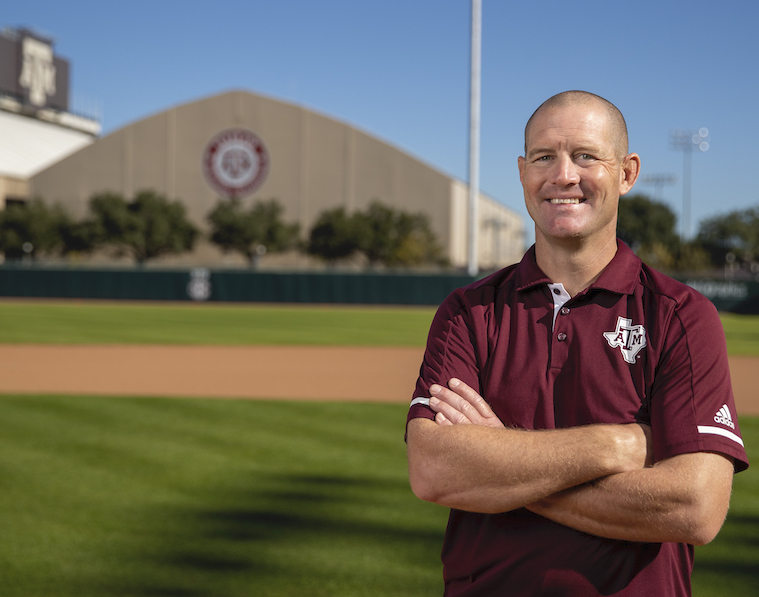By John Kmitta
As STMA President Nick McKenna, CSFM, takes the helm of the association, he is well aware that the past year will have a lingering effect on the sports field management industry.
“2020 is going to carry into 2021,” said McKenna, who serves as assistant athletic field maintenance manager at Texas A&M University. “Worst case, we could be looking at five years before we get into a true semblance of normal. But I try not to look at challenges as challenges; I try to look at challenges as opportunities. I look at how we, as an association, were able to pivot, what we were able to do, and the ways we found that we could assist our members.”
Specifically, McKenna points to STMA’s letter of support stating that sports field managers should be considered essential personnel, the Route to Recovery Task Force, the Route to Recovery guides STMA produced in conjunction with SportsField Management, and the virtual Town Hall meetings STMA hosted throughout the year to help members deal with COVID-19-related challenges.
“As much of a challenge as this was, we turned it into an opportunity to come up with new ways to connect with our members, to bring new value to them, to further evolve our association,” said McKenna. “And I hope those are things that we continue down the line.”
McKenna added that STMA is now presented with a unique opportunity to evaluate where it is at as an association, what it wants to be, and where it goes from here.
“This year has provided us an opportunity to really look under a microscope at how we serve our members, and what we are doing for them,” he said. “The sky’s the limit now. We can make it become what we want.”
According to McKenna, some of the greatest strengths of STMA and its members are adaptability, versatility, and the ability to succeed despite any challenges they face.
“I think that is going to show itself in the years to come,” he said. “Regardless of where we are at now – regardless of what has happened to us as individuals, as an industry, as an association – we will adapt and move forward. We will survive, and we will become stronger. We might look back and say that 2020 was the year that STMA took the next step toward enhancing our professional image, and toward having safe playing surfaces for all athletes. I’m confident that our association and our members will come through this stronger than ever. I think we do that by working together, by working collaboratively like we have done throughout this past year.”
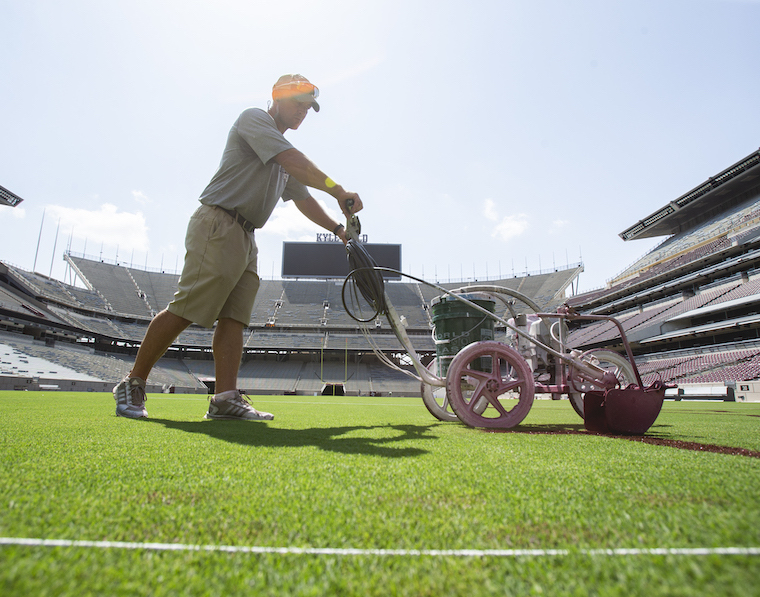
Born in a small town
Born and raised in rural Iowa, McKenna grew up in an agricultural setting. His father managed a local swine operation, and would take Nick to work with him on the weekends. By the time McKenna was 10 years old, his family had purchased its own hog farm.
“That’s how I fell in love with the agricultural industry, working with my hands and being outside,” said McKenna. “That’s where I owned my work ethic and picked up a lot from my parents about how to go about life, be a good hardworking person and a contributing member to society.”
The family farm was located outside a town of approximately 300 people, and the town where McKenna attended school – Vinton, Iowa – was home to fewer than 6,000. The community was surrounded by agriculture.
In addition to working on the family farm, McKenna earned money as a youth by mowing lawns – a job that was passed down to him. McKenna has an older sister, an older brother, and a younger sister; and as the older siblings moved on from the lawn care duties and went to college, that role got passed on to him.
McKenna’s father would give him money to help with mowing for the local church, area cemeteries and neighbors – in addition to nine acres on the family farm.
“I don’t know a man that works harder,” McKenna said of his father. “From a very early age, I learned about hard work, about doing a good job, giving my very best effort to anything I did.”
McKenna added that, to this day, he tries to be the hardest-working person out there.
“I might not be the best sports field manager, or the smartest sports field manager, but, by God, I will outwork you,” he said.
As a youth, McKenna competed in soccer, football, baseball and wrestling. But as he got older and more involved with farming, he began to phase out of everything except wrestling – a sport that remains near and dear to him.
“A lot of the characteristics and the things it teaches you as a person I have carried on into my personal life as far as hard work and discipline – because it is an individual sport where you are accountable for your own actions,” he said. “I think that has defined a lot of who I have developed into as an individual.”
Throughout high school and into college, McKenna was also involved with Future Farmers of America (now referred to as just “FFA”), a youth organization that uses agriculture as an avenue to teach leadership, career development and personal growth. During his early college years, McKenna served as a state FFA officer for two years (one year as secretary and the next as state president). McKenna credits his work with FFA for much of his development as an individual, and said that he still uses a lot of the skills he developed through FFA.
When it came to college, McKenna knew he wanted to attend Iowa State because he wanted to pursue a career in agriculture. He originally majored in Agricultural Biochemistry, because it was a growing, high-paying field. But three quarters of the way through his freshman year, McKenna realized that he was on the wrong career path, and that he didn’t want to work in a lab. At that point, he switched to a double major of Ag Education and Animal Science.
“I wound up in that major for most of my sophomore year,” said McKenna. “That was when I was finishing up my term as FFA president. I think I was getting a bit burned out on the Ag Ed side of things.”
McKenna reevaluated once again and decided to focus on the things he had really enjoyed – growing up on a farm raising hogs, and the lawn mowing work he had done with his father. At that time (in early 2000s), McKenna did not see a viable future for himself in the hog industry, so his focus shifted to the turfgrass industry.
According to McKenna, Barb Clawson, program coordinator for the turfgrass program at Iowa State, introduced him to potential career opportunities in the turfgrass industry. While most of the other students in the Iowa State turfgrass program were focused on golf course management, McKenna – a self-described college sports junkie – saw a better fit for himself in sports field management.
“From that point on, I really just put blinders on, dove right in, and my focus was tunnel vision on the sports field industry and creating a career for myself in this industry,” said McKenna.
McKenna knew he needed experience, so he began to regularly reach out to Mike Andresen, CSFM, in the Iowa State athletics department regarding potential opportunities at Iowa State.
“Unfortunately, Mike didn’t have any openings for my first year and a half,” said McKenna. “Then, the summer before my last semester at Iowa State (with the two major changes it took me an extra semester to get done), Mike called me and said he had an opening on the crew as one of his intern positions. So, I jumped at that chance. I got to do my last fall semester at Iowa State working under Mike Andresen, who is one of the greatest people in our industry. From there, I was going to do whatever I could to impress him, work hard, try to make a positive image for myself in his mind, and see where it would lead me.”
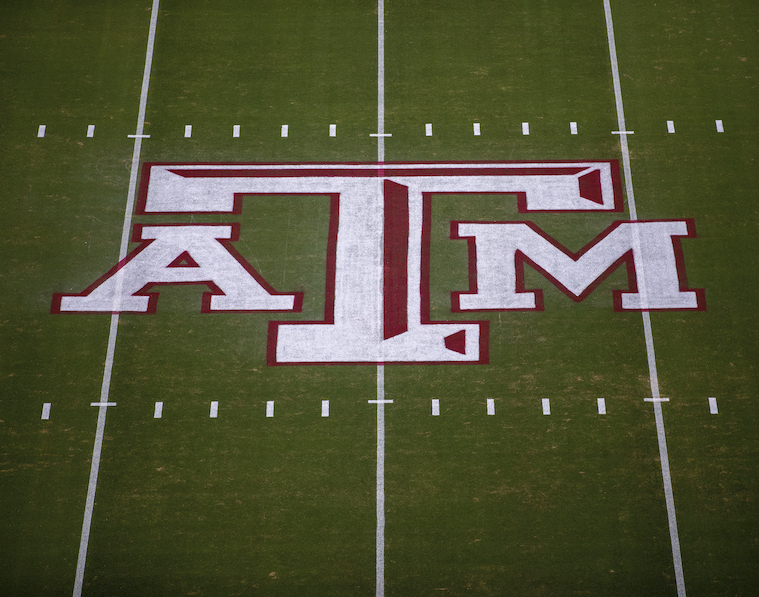
Inspired by a sense of community
“My path to Texas A&M from there is kind of weird,” said McKenna.
While McKenna was at Iowa State, his brother was pursuing a Ph.D. at Texas A&M. So McKenna decided to travel to Texas A&M for Thanksgiving break to visit his brother and sister-in-law.
The first Thanksgiving McKenna visited Texas A&M was in the fall of 1999. McKenna drove through the night, and arrived in College Station, Texas, around 6 a.m. on November 18. He got some sleep from driving through the night, and later awoke to news of tragedy on campus.
Dating back to the early 1900s, Texas A&M had an annual fall tradition of building a bonfire as a symbol of its burning desire to beat the University of Texas football team. Through the years, the bonfire grew in terms of both symbolism and sheer size. By the late 1990s, the bonfire was a complex, wedding-cake-style construction consisting of more than 8,000 logs upon completion that took more than 100,000 man-hours to complete (often with as many as 5,000 students taking part in some aspect of the project).
But in the early hours of November 18, 1999, while McKenna was still en route to College Station, 58 Texas A&M students and former students were working on the construction of that year’s bonfire. Shortly after 2:30 a.m., the nearly 60-foot-tall stack, consisting of nearly 5,000 logs, collapsed.
The collapse left 12 dead and 27 injured.
“As an outsider, I had no understanding of what that meant and how important it was to the university and community,” said McKenna. “But by being there that week, I got to experience that, and quickly learned what a special and unique place Texas A&M is. How the community and the university came together around that tragedy. So, from that point, it was hard not to realize how special A&M was, and fall in love with it.”
In the years that followed, McKenna’s girlfriend (now wife), Holly, made the journey to Texas A&M with him. She, too, fell in love with the university, and decided to pursue her master’s degree there.
McKenna told Mike Andresen that Holly was looking to get her master’s degree from Texas A&M, and asked Andresen if he knew of any career opportunities in Texas.
Andresen had longtime friendships with Leo Goertz (at that time head athletic field maintenance manager) and Craig Potts, CSFM, (then assistant athletic field maintenance manager) at Texas A&M. Andresen put in a call to Goertz.
“The timing worked out perfectly, because Leo had a job that was coming open,” said McKenna. “He asked Mike if he would vouch for me. Mike said he would recommend me. Leo said, ‘He’s hired.’ I didn’t have to interview. He just hired me off the word of Mike Andresen.”
So McKenna moved to College Station, Texas, straight out of college, and started working for Goertz and Potts.
“I had no warm-season grass experience, no baseball experience, and limited softball experience,” said McKenna. “So I spent the next two-and-a-half years just working for the athletic department as a general groundskeeper. I worked anything and everything I could, because a) I needed the money, and b) I needed the experience. So, I was just trying to soak it all in like a sponge.”
According to McKenna, the dynamic between Goertz and Potts was great. “Leo always joked that he was the hand shaker and back slapper, and Craig was the nuts-and-bolts guy. I consider myself somewhere between the two. I related well with Leo on the general management side and the people management, and Craig and I made a strong connection with the agronomics and the science behind everything.”
McKenna said that some of his favorite times with Goertz and Potts didn’t even revolve around work.
“Leo and I would sit around for an extra hour or hour and a half at the end of the day and just talk,” said McKenna. “The things I learned from him beyond growing grass were the things that really stuck with me.”
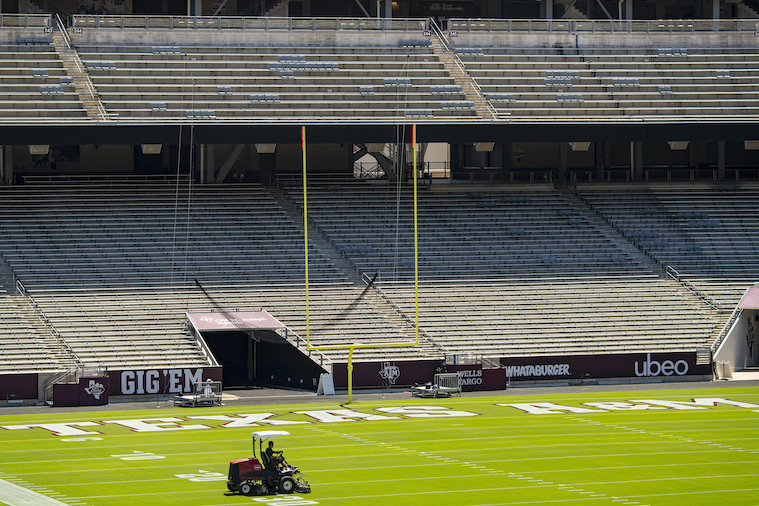
New chapters in life
After two and a half years at Texas A&M, McKenna’s wife got a teaching job back in Iowa, and McKenna ended up taking a job in Iowa with a nursery landscape company for a year. He then moved on to a job selling commercial groundskeeping equipment for a local Toro distributor.
“I quickly figured out that I wasn’t ready for sales yet,” said McKenna. “I missed being on the fields too much. I started to explore how to get back into the sports field management industry.”
From there, McKenna headed to Virginia Tech for a graduate assistantship position funded by the Virginia Tech athletic department. It allowed McKenna to work for the athletic department when he wasn’t busy with his graduate school obligations.
McKenna was familiar with Michael Goatley, Ph.D., at Virginia Tech, and felt that Virginia Tech presented him with a unique opportunity to work with new people in a new environment. Having already grown grass in both cool-season and warm-season climates, McKenna felt that working in the transition zone would allow him to confidently go anywhere in the country and take on any challenges.
“So we made the decision to go to Virginia Tech, and it was a blind leap,” said McKenna. “I had never been to Blacksburg, I hadn’t gotten the chance to visit. I had just had a couple phone calls with Dr. Goatley and with Jason Bowers [CSFM], who was the sports field manager for Virginia Tech athletics at that time. We found an apartment online – didn’t see it until the day we moved in.
“Everything I needed to know about Dr. Goatley I knew the day we moved in,” McKenna added. “He showed up with Dr. Askew and two of their graduate students on a 110-degree day, and helped me unload our truck and trailer and helped us get moved in.”
According to McKenna, his time at Virginia Tech was a good learning experience because he got to see the frustrations of growing both bermudagrass and bluegrass fields in the transition zone, and, thanks to Bowers, he was able to develop as a sports field manager and decision maker.
“He was trusting and willing enough where he basically put me in control of the soccer and lacrosse facilities as his graduate assistant,” said McKenna. “He gave me my first opportunity to have full control of the field, and develop my skillset where I was making the everyday decisions about what I was mowing, how often I was mowing, when I was going to fertilize, what I was going to use, how much water I was going to use, coordinating schedules with the teams. He really gave me the freedom that I hadn’t had to that point in my career to really run my own show. I can’t thank him enough for giving me that responsibility.”
After two years as graduate assistant, just as McKenna’s assistantship funding was about to run out, Bowers left the Virginia Tech athletic department, and a full-time position opened up for McKenna in a role that allowed him to oversee the baseball facilities.
“Going to Virginia Tech and working with Dr. Goatley is one of the best decisions I have ever made in my career,” said McKenna. “I pull so much from what I observed from him. To this day, the greatest thing is that we developed a close friendship. He wasn’t just my advisor, he wasn’t just a person on my graduate committee, he became a close friend, and that continues to this day.”
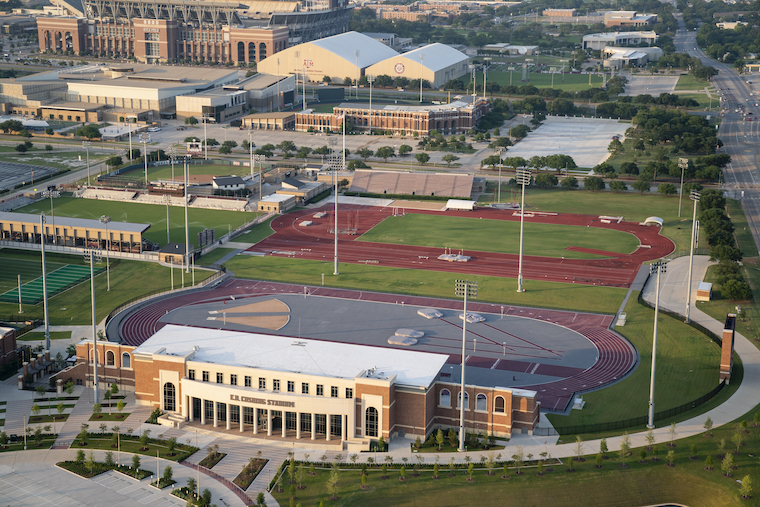
Returning to College Station
In the summer of 2011, Goertz reached out to McKenna to let him know that Texas A&M was beginning a $27 million renovation to its baseball stadium, the grounds manager for baseball had just left, and Goertz himself was beginning to think about retirement and a succession plan for the Texas A&M program.
“The idea was, if I was interested, to come back and take over the baseball facilities,” said McKenna. “Baseball was Leo’s love, so, for him to be willing to hand that off to somebody, that meant a lot to me.”
The long-term plan Goertz laid out for McKenna would be that Potts would – upon Goertz’s retirement – move into the lead role and McKenna would move into the role as assistant athletic field maintenance manager.
“The first three or four years back, my primary responsibilities were overseeing the baseball facilities,” said McKenna. “The first day on the job, we were at the stage of construction that I pulled into the parking lot and I could literally see through the stadium. We were standing in the parking lot and could see the field.
“That presented all its own unique challenges,” McKenna added. “There were days when they were like, ‘We have to park a crane on home plate.’ There was a construction fence wrapped from the foul pole around home plate back up to the other foul pole. That was how we played that entire fall, and the field got put back together in December and January. It was a good experience to go through to learn how to balance all those different dynamics.”
McKenna continued in his role overseeing the baseball facilities until Goertz’s untimely death – at the age of 55 – in December 2015. As a result, the timeline of Potts moving into the head role and McKenna transitioning to the role of assistant athletic field maintenance manager started not because Goertz retired, but because he unexpectedly passed away.
“Craig and I had to develop our own dynamic,” said McKenna. “It took us a year or two just to figure out how he and I would work together, and how those responsibilities would balance out. We’ve reached a really neat, fun dynamic that makes it a really enjoyable place where I can continue to have the additional responsibility I’m looking to have, and continue to grow as a manager and as a person.”
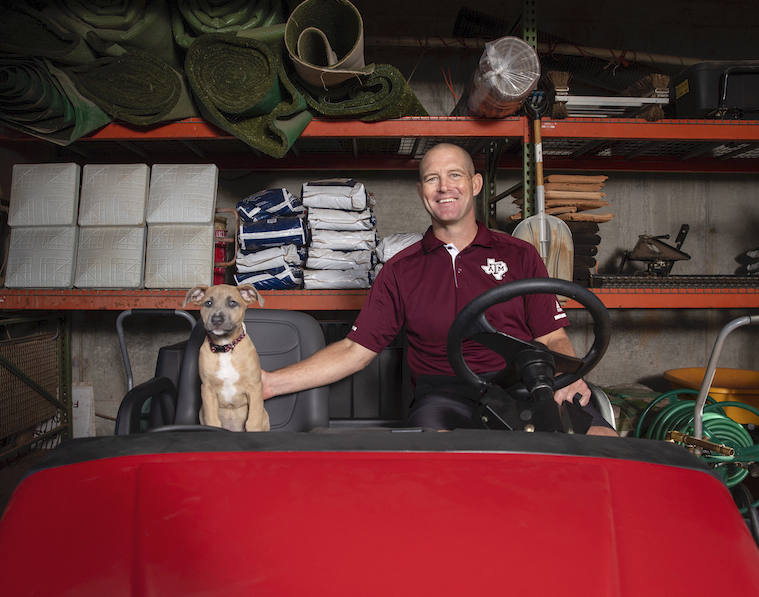
On the job
McKenna’s crew at Texas A&M is part of the athletic department, so its focus is on all Texas A&M intercollegiate and athletic playing surfaces.
“We don’t have to deal with the rec sports fields, we don’t have to deal with campus grounds,” he said. “We get to solely focus on the athletic department fields and facilities. We are responsible for football, baseball, softball, soccer, track and tennis.”
The crew manages Kyle Field, Texas A&M’s natural grass football field; two full-size natural grass practice fields for football; an indoor synthetic field for football; Olsen Field at Blue Bell Park for baseball (which serves as both the practice field and playing surface); Ellis Field for soccer (practices and games); two softball fields – Aggie Softball Complex, and Davis Diamond, which is a new $29 million softball complex; and a new track facility, as well as an older track complex.
“It’s roughly 16 to 18 acres of highly maintained athletic playing surfaces,” said McKenna.
The crew is also responsible for the landscaped areas inside and around the facilities, which is another 22 to 24 acres of general turfgrass areas.
The full-time crew consists of Craig Potts, CSFM, head athletic field maintenance manager, McKenna, and four full-time groundskeeper assistants – with one groundskeeper assistant assigned to each major facility (football, baseball, soccer and softball). The groundskeeper assistants are the eyes on the ground every day handling the day-to-day prep, which has freed McKenna up to be an umbrella over everything. Depending on the time of year and the season, personnel can be moved as needed to whatever the primary focus is for that day.
Beyond the full-time crew, much of the labor force comes through college students, with 7 to 12 students working (during a typical year).
“Obviously, if we can get students that are in the turfgrass program at A&M, we love to give them opportunities to expand their skillset, come in and experience things in their fields of study,” said McKenna.
McKenna and Potts work collaboratively to oversee everything. “We will figure out what we need to get done, what are the pressing issues, and formulate our plan on a daily basis, then distribute that to our crew,” he said. “What’s important now? What do we need to get accomplished today? What would we like to get accomplished if we have time? And what are the things that can wait until tomorrow or next week?”
According to McKenna, that cycle perpetually evolves, and the bulk of the work revolves around coordinating the crew and making sure the daily practice preparations get done for each team.
He added that one of the things he loves about the college atmosphere is that everything is variable, no two days are the same, and it isn’t the exact same field and sport day after day after day.
With regard to COVID-19, and its impact, McKenna said that he is blessed that he and his crew were minimally impacted.
“We were fortunate that the athletic department was able to maintain all of our staff from the time everything got shut down in March,” he said. “We were right in the middle of the college baseball and softball seasons when everything started to get shut down. We did lose our student help. Obviously, with events and activities ceasing on our fields, the wear and tear on them was a lot less, so the maintenance wasn’t quite as intensive.”
McKenna added that the silver lining of the past year for him was shifting to 40-hour workweeks.
“It brought a sense of balance back to my life and allowed me to get back to the roots when I first started, and the job was about growing grass and maintaining the fields,” he said. “It was kind of a nice reset and recharge my battery.”
Outside of work, McKenna and his wife, Holly, are devoted to their dogs. They have three dogs – all rescues – but also foster pit pulls or pit bull mix breeds, and are passionate about advocating for the breed. During 2020 alone, the McKennas provided a foster home to 21 rescues.
“It was refreshing to be able to spend weekends at home with my wife and the dogs. But I’m fortunate in that I was minimally impacted, and I didn’t have to worry about income loss or job loss.”
Aside from any COVID-related challenges, McKenna said the biggest challenges he and his crew face are the things they can’t control, namely weather and scheduling.
“We are at the mercy of Mother Nature with what we do. We just have to be adaptive and responsive to it,” he said. “We have very little to no control of the scheduling of what happens on our fields and in our facilities. As we are seeing the dynamic of college athletics trending more toward the professional model where you have these multi-million-dollar facilities that have to be used for more than just seven football games per year, you’re looking for ways to bring in additional revenue. So you don’t have control of the practice schedules, the game schedules, and then you combine that with what Mother Nature is going to do to you, there are so many things that are beyond your control.”
McKenna said he makes a conscious effort to control what he can control, and tries to make the best of every situation. He added that adaptability is one of the biggest keys to success as a sports field manager.
“When you look at all the things we have to deal with, all the things that are beyond our control, and the challenges that we face, you have to be versatile, you have to be flexible, you have to be able to adapt and overcome different situations,” he said. “It’s a rewarding experience to go through these challenges and come out on the other side. We found a way through it. What’s the next challenge? What’s the next opportunity?”
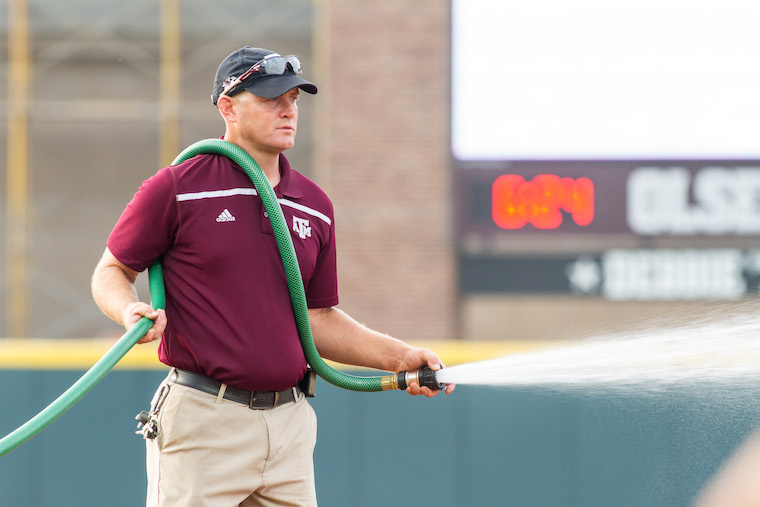
A sense of pride
McKenna has made the most of his opportunities, and is proud of several career achievements.
First is winning STMA College Football Field of the Year in 2005 during his first stint at Texas A&M.
“It was a big point of pride for our university, for our crew,” he said. “I thought it was neat to be recognized for the work we did and be recognized as the best college football field in the country that year.”
Second on his list of accomplishments was getting his CSFM designation (in 2011 while at Virginia Tech).
“Mike Andresen set that precedent for me, and I set that goal,” said McKenna. He added that Andresen introduced him to STMA, professionalism beyond one’s own career, being involved in the industry, being a professional at the next level, getting involved and giving back.
“Mike was the first CSFM I knew,” said McKenna. “So, very early on, that was one of the things I put up there as a goal. That was a big enough priority to him to attain, then that is important for me. As a 22-year-old college student, you look at that and think that is a long way away. So, when I finally got to the point where I got to test and attained that, it was a big deal. It’s a huge sense of accomplishment to do so.”
According to McKenna, the CSFM program is important to STMA and the industry.
“We are always trying to enhance and establish our image as professionals in our industry,” he said. “I think that the CSFM designation is a way to help steer that.”
McKenna added that it would be ideal if the program would get to the point where the designation is respected and recognized throughout the industry, and employers include “CSFM preferred” or “CSFM required” in job descriptions so that those with their CSFM designation are recognized as the best of the best.
He added, “I know hundreds of guys who are equally or more skilled as field managers than me who don’t have [the CSFM designation], and have no desire or need for it. But I think, as an association, it is an important program for the future of our industry.”
McKenna also points to his role as a teacher and mentor to the next generation as a career achievement.
“Part of my role as a sports field manager, especially when working with students, is that I’m an educator,” said McKenna. “I’m helping develop that next generation of sports field managers – I hope. I enjoy seeing the successes of these young adults after they leave us. To me, that is so rewarding. I hope that I had at least a small role in that path for them.”

Giving back to the industry
McKenna has also made it a point to be involved and give back to the industry, including serving on the Virginia Sports Turf Board, in Texas at the state level, at the national level on various committees, and eventually on the national board.
“I just made it a priority that I want to keep being involved and I want to keep trying to give back,” said McKenna.
He added that being involved with FFA taught him about serving beyond himself.
“When we are young, we think about ourselves,” he said. “But as we continue to develop as people, as we mature and grow, we start to think outside ourselves.”
As for involvement in the industry at the state/chapter level or at the national level, or both, McKenna said, “If you have a vision for what your career should be, for what your job should be, for what your industry should be, you have to become actively involved to help steer it. You can’t score in the game if you are not on the team. If you see something you don’t like, the only way things get steered and controlled is if people get involved and take a vested interest in it.”
He added that the strength of STMA is its members.
“If they are not actively involved and help drive us where we need to go, then we are going to fall flat and fail,” he said. “We have to find a way to get them engaged, get them to take a vested interest and keep the association moving forward.”
McKenna hopes members will continue to reach out to STMA for help and guidance.
“At the root of it, our association is here for our members,” he said. “I think our role is to help them however we can.”
McKenna wants to continue to work to improve the professional image of sports field managers, and also develop future sports field managers.
“I’m always going to have a focus on the teaching side and developing the next generation,” he said. “As you look across the industry, that is one of the major problems. I think we need to figure out where we go and how we get people involved in our industry so that we can continue to develop these well-trained sports field managers.”
McKenna added that the top goal during his upcoming year as STMA President is to develop a long-term strategic plan. Due to COVID-19, and the inability to meet in person as a board, STMA developed a one-year bridge strategic plan. According to McKenna, the board now needs to have a strategic plan session to develop its vision for where the association is headed the next two to three years and how to get there.
As STMA president, he plans to rely on his fellow board members to steer the association and determine priorities.
“It’s not just my vision. I just happen to be the person that they put at the rudder for the year. There are 12 other amazing professionals I get to work with. I’m going to rely on them to help me know what our priorities are going to be. My job is to orchestrate the symphony.”
John Kmitta is associate publisher and editorial brand director of SportsField Management magazine.


